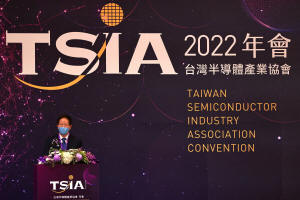Taiwan and U.S. tensions with China pose 'serious' challenges for chip
industry - TSMC
 Send a link to a friend
Send a link to a friend
 [October 19, 2022]
By Sarah Wu [October 19, 2022]
By Sarah Wu
HSINCHU, Taiwan (Reuters) - Rising
Taiwan-China and U.S.-China tensions have brought "more serious"
challenges for the semiconductor industry, the chairman of Taiwanese
chipmaker TSMC said on Wednesday.
Taiwan is a major producer of chips used in everything from cars and
smartphones to data centres and fighter jets, and Taiwan Semiconductor
Manufacturing Co Ltd (TSMC) is the world's largest contract chipmaker
and Asia's most valuable listed firm.
While the chips sector is already bracing for waning demand as red-hot
inflation squeezes spending, Taiwan faces a tougher situation -
sandwiched between its largest export market China and its main
international backer and arms supplier, the United States - especially
as Beijing steps up military pressure to force Taipei to accept Chinese
sovereignty claims.
Speaking at the Taiwan Semiconductor Industry Association's annual
convention, TSMC Chairman Mark Liu said: "The U.S.-China trade conflict
and the escalation of cross-Strait tensions have brought more serious
challenges to all industries, including the semiconductor industry."
In recent years, China's government has "never stopped promoting its
domestic semiconductor industry", including chip design, manufacturing,
and packaging, he said.

The United States has also passed its CHIPS Act to vigorously support
local research and development and manufacturing, Liu said.
Liu said he looked forward to Taiwan's industry, government and academia
developing "more concrete, constructive measures" on industrial policies
related to innovation, research, talent education and retention "to
maintain Taiwan's most critical semiconductor industry advantages".
He noted that this year the "industry value" of Taiwan's chip sector is
expected to have risen one-fifth compared with 2021, even with the
impact of Sino-U.S. trade friction and geopolitical problems.
[to top of second column] |

TSMC chairman Mark Liu makes a speech at
the Taiwan Semiconductor Industry Association convention in Hsinchu,
Taiwan, October 19, 2022. REUTERS/Ann Wang

While Liu did not make direct mention of it, the sweeping set of
export controls announced by the United States this month, aimed at
slowing China's progress in advanced chip manufacturing, is expected
to also impact Taiwanese chipmakers.
The new rules require U.S. companies to cease supplying Chinese
chipmakers with equipment to make relatively advanced chips, though
Washington has granted some non-Chinese companies operating in China
one-year licenses."
"The difficulty this time will be a very big challenge," Nicky Lu,
chairman of Taiwan chip design firm Etron Technology Inc, told
reporters ahead of the event. "No one will escape the impact."
Frank Huang, chairman of Powerchip Semiconductor Manufacturing Corp,
said the sector was caught in a difficult situation.
"We do business on both sides of the Strait. So we can't listen to
the U.S. and not do any business with mainland China. Then what
would everyone eat?" Huang said. "Our industry's position is to
maintain our competitiveness."
TSMC, which makes most of its chips in Taiwan, last week cut its
annual investment budget by at least 10% for 2022 and struck a more
cautious note than usual on upcoming demand.
TSMC's dominance in making some of the world's most advanced chips
for high-end customers such as Apple Inc and Qualcomm Inc has
shielded it in recent quarters from the downturn flagged by
chipmakers including Micron Technology Inc.
(Reporting by Sarah Wu; Writing by Ben Blanchard; Editing by Himani
Sarkar & Simon Cameron-Moore)
[© 2022 Thomson Reuters. All rights
reserved.]
This material may not be published,
broadcast, rewritten or redistributed.
Thompson Reuters is solely responsible for this content.
 |